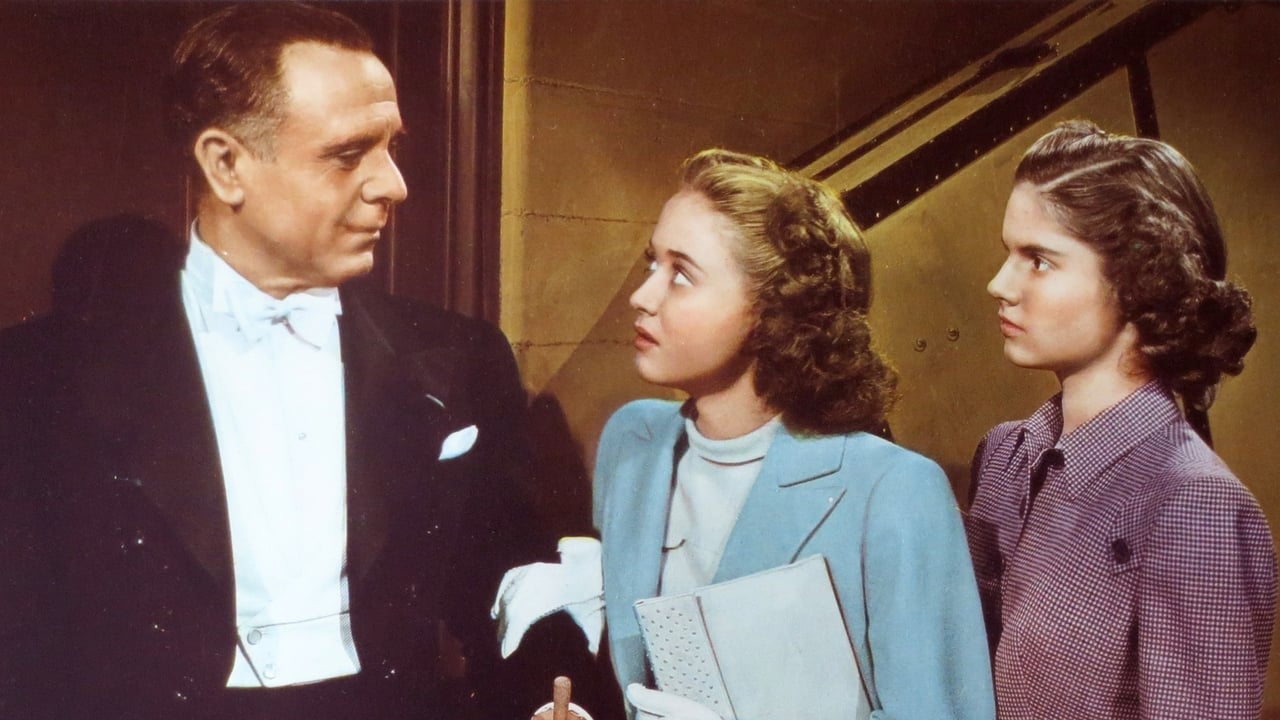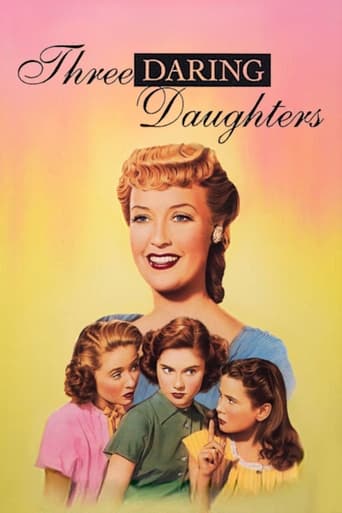

Copyright 22 January 1948 by Loew's Inc. A Metro-Goldwyn-Mayer Picture. New York opening at the Capitol: 12 February 1948. U.S. release: March 1948. U.K. release: Not recorded (announced for possible December 1947 opening). Australian release: 8 April 1948. Cut to 10,354 feet or 115 minutes in Australia. 119 minutes. U.K. release title: The BIRDS AND THE BEES.SYNOPSIS: We are asked to believe that a very attractive fashion magazine editor (where have we seen this character before? Answer: Lady in the Dark) is so light of brain that she has brought her three teenage daughters up to believe their estranged father is a fine man who will return to them some day, even though (a) he's been gone at least twelve years and (b) in actual fact he's a heel she was glad to divorce. (Where does this plot hail from? Answer: Mostly from producer Pasternak's own Three Smart Girls). NOTES: The stage play opened at the Cort on 26 September 1946 and was yanked after only 28 performances. Barbara Robbins played Louise Morgan. The daughters were enacted by Sybil Stocking, Rosemary Rice and Joyce Patten. Although panned by all New York's influential critics (except Wanda Hale of the Daily News), the movie did mighty well at the domestic box-office, achieving 28th position for the year. Overseas, however, the movie bombed. Significantly it was one of the few MacDonald movies not re-issued by M-G-M in response to the great Jeanette MacDonald revival of the late 1950s, even though prints were available. (The other films that fell into this category were Broadway Serenade, Cairo and I Married an Angel which were packaged for television instead). COMMENT: A disappointment all around. There so many things wrong with the movie, it's hard to know where to begin. Let's just say that Miss MacDonald (often beautifully gowned) struggles gamely with both the unbelievably sudsy yet sexless character she's forced to enact in this incredibly vapid script plus a diverse collection of players headed by Jose Iturbi and Jane Powell who offer her little or no support. Flat, disinterested direction by Fred Wilcox doesn't help either. To his credit, producer Pasternak wanted Deanna Durbin for the Powell role, but Universal refused to loan her out. Although the screenplay was then re-written for Powell, she makes an poor substitute. What's worse, she's very ineptly recorded here. She doesn't sing so much as screech. At least Jeanette MacDonald's songs are more faithfully rendered, but acting-wise, she is stuck opposite the egotistic Iturbi, who not only stupidly insisted on using his real name for what is a character part (thus creating audience irritation and confusion), but on making believe that he conducted the M-G-M studio orchestra from his piano. In actual fact, of course, Georgie Stoll conducted. Despite his competent piano-playing, Iturbi is such a thorough pain-in-the-neck, he builds up little sympathy. OTHER VIEWS: A thin, crawling story of mother love and second romance which leaves one bleary-eyed and exhausted from bright colors and dull, girlish talk. - New York Herald Tribune.
... View MoreThis is not, by any means, a great movie. In fact, if it had starred some anglo American male in the male lead, it probably would be of no interest whatsoever.But that's not the case. It stars the Spanish pianist José Iturbí, with whom the very Caucasian Jeanette MacDonald falls in love and marries. That never once enters into the dialogue when MacDonald's three daughters object to the marriage, but it probably entered into the minds of more than one of the audience of the time.And yet, it truly is not an issue in the movie.Which makes this very interesting for its day.Other than the "racial" issue, it's an OK, undistinguished flick. We get to see a lot of Iturbí playing the piano, which is fun. He was neither handsome nor a great actor, but he was a fine pianist, and he gets a series of real blockbuster numbers.MacDonald doesn't get to sing much, and gets no romantic duets, which is a real change from her previous films.Jane Powell is fine in her numbers, but undistinguished.See it for the non-issue.
... View MoreThis story is dominated by Jeanette Macdonald and Jose Iturbi for the first half of the film. Jeanette plays the divorced mother of three daughters led by Jane Powell. Their father was a deadbeat, but mother paints a brighter picture of them for her daughters. She needs a vacation away from the daughters. She takes a cruise and meets Jose Iturbi and they fall in love and marry. Meanwhile, the daughters believe they can help her by bringing back their father. They tell their mother when she arrives that he is coming. She loses it and scolds them. They are sad and not sure what they did wrong. Jose shows up and Jane is happy when he tells her he is Jose Iturbi(he is playing himself). She drops a line about her father coming home and he gets a lump in his throat and tries to leave(funny scene). The make him stay and he implies he is there to give Jane a tryout. Mother walks in and they keep the truth from the daughters. Later they tell them together and the girls want their real dad. The man they went to to get their father back, sets them straight. They apologize to their mother. Mother also apologizes and admits she should have told them the truth about their real father. The girls go to see Iturbi and tell him they want him back. The final scene has the man who the girls originally saw to get their real father back, reuniting mother with Iturbi and the girls. A real nice ending to a good film.
... View MoreSilly but enjoyable musical comedy with Jeanette McDonald playing a character very much like herself, and Jose iturbi playing her love interest, a character even more like himself -- himself! Jane Powell and her two sisters are both multi-talented and precocious, and Edward Arnold heads a fine veteran supporting cast. Certainly not a great movie, but a pleasing one.
... View More